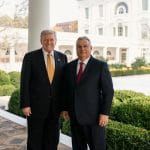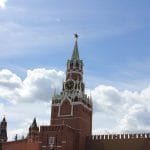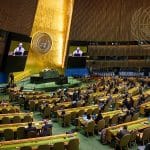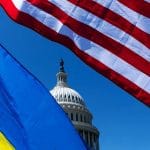While the global sanctions campaign against Russia is not yet a month old, investors and sanctioneers held their breath this week as Russia struggled to make a $117 million coupon payment on March 16 which has partially come through at this point.
Meanwhile, new sanctions measures are being put in place from a number of directions in an attempt to convince Putin to end the Ukraine invasion. While more than simply fine-tuning, most of these new measures widen the sanctions net, but are generally not massive new sectoral prohibitions that will substantially increase pressure on the stuttering Russian economy.
Russia sends repayment in dollars – nothing else matters
Some of Russia’s creditors have received dollar payments on the $117 million in coupon payments that came due on March 16, according to Reuters reporting one day after the deadline. Because there is a 30-day grace period attached to these obligations, payments received after the due date indicate Russia is at least working to fulfill its obligations and has decided against blustering the West with an offer of ruble payments only, legal under new Russian legislation but largely unacceptable to the country’s creditors.
Washington had previously announced it would not block these particular repayments from Russia. However, sanctions-related technical issues related to funds transmission have delayed a number of Russian payments over the course of March.
This crisis apparently averted, Russia-watchers are now focusing on the default-triggering potential of two upcoming Russian sovereign debt payments, one on March 31 ($360 million) and another on April 4 (approx. $2 billion) in view of Russian legislation allowing ruble-denominated repayments instead of dollars or euros. Aware of these two deadlines, western credit agencies are increasingly noting that default may be “imminent.”
Economic woes mount
The western sanctions campaign has taken a mounting toll on the Russian economy, despite Russian claims to the contrary. There are increasing reports of panic buying, bank runs and snap shortages, although we are too early in the sanctions campaign to take these as proof of sustained success. The ruble plummeted sharply to 154 per dollar once the invasion began and the first wave of sanctions was announced, from its pre-war level of 84 per dollar, but has since stabilized and recovered substantially to around 97 per dollar. Most analysts nevertheless believe this recovery is only temporary as inflation accelerates and Russian GDP begins to decline, most likely by at least 15 percent this year.
One Russian automaker said it was experiencing serious input shortages and would be bringing workers’ summer vacations forward to April to generate breathing space. Early indications of such industrial disruptions will certainly bring cheer to the Russian economic monitors in the global sanctions task force announced in the first week after Russia invaded Ukraine.
Putin announced initial governmental relief steps on March 16 to attempt to cushion the undeniable impact of rising prices, which he still claimed was temporary. He promised to raise the minimum wage and the salaries of all public sector workers.
New sanctions further tighten the network
New sanctions announced by the US, EU and others over the past ten days were not particularly newsworthy as most consist of expanded lists of sanctioned individuals/organizations close to the Putin inner circle and a few new trade restrictions. Taken in total they are a bit more significant than simple fine-tuning, which is largely what we will be seeing from this point onwards unless/until the EU reduces its still massive energy purchases from Russia.
Removal of Russia’s “Most Favored Nation” (MFN) tariff status announced a week ago in a coordinated manner by the G-7 requires legislative action in a number of cases, especially the US. It is in many ways only symbolic as Putin last week also announced export bans on a number of the country’s traditional exports not yet under sanctions. The US and EU have also announced they would ban the export of luxury goods favored by the Russian elite.
The EU’s fourth sanctions package approved March 15 covers the above-mentioned suspension of MFN treatment for Russia, adds many more Russian oligarchs and business elites to the travel ban, and blocks luxury goods exports as the US has done. Also important were the bans on transactions with a number of state-owned enterprises plus a prohibition on energy sector investments and new export restrictions on equipment, technology, and services for that sector.
The EU is also banning certain Russian steel product imports currently under EU safeguard measures, amounting to approximately €3.3 billion in lost export revenue; the lost Russian quotas will be redistributed to other producers.







